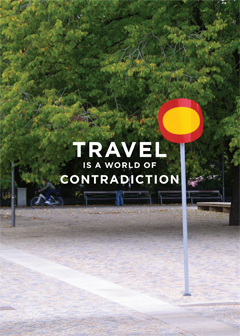Topic Director: Karen Detlefsen
Assistant Professor of Philosophy, Penn
Travel is a phenomenon full of contradictions. A major factor in world economy, it also stimulates intense personal experience. It both fans the frantic pace of contemporary existence and provides an escape from it into a world free of schedules and deadlines. Travelers form a motley group. Chaucer's Canterbury pilgrims, Marco Polo, Jack Kerouac, and Condoleezza Rice have all spent significant time 'On the Road,' and many a plot has turned on encounters between 'Strangers on a Train.' Wanderlust, pilgrimage, quest, crusade, Grand Tour, exile, diaspora: the language of travel is numinous with history, adventure, and struggle. Yet U. S. Customs boils it all down to 'Business or pleasure'?—a perplexing choice after the fruitful ambiguities of time spent away from home.
For millennia—at least since the epic of Gilgamesh—travel has been understood as a unique opportunity for education and self-transformation. The Grand Tour of the Enlightenment finds its echo still in the study-abroad programs of our day. Travel is 'broadening,' the wisdom goes, shaking us out of our most deeply held convictions, including the conviction that our peculiar habits, beliefs, and values are universal. 'Culture shock,' a by-product of travel, typically occurs twice: once when we go abroad and again when we return to a home our altered eyes hardly recognize.
Travel is a major determinant in the history of the arts. Not only is the journey an archetypal theme in literature, photography, and film, but the influence of foreign cultures on travelers has profoundly altered the course of these arts, as well as music, architecture, design, fashion, and cuisine. Would Cubism have existed if Picasso had not happened upon African masks on a trip to Spain? Would Joyce's Ulysses have been written without the storm-tossed wanderings of Homer's Odyssey?
Travel creates encounters. Pidgin and creole are the linguistic corollaries of displaced peoples; traffic languages, such as English, are the linguistic corollaries of displaced power. Discrepancies in wealth and power between the traveler and the host have spawned such abuses as slavery and colonialism, and the treatment of people as objects of curiosity, study, and exploitation has fostered racism. The postcolonial concepts of hybridization and mongrelization reflect travel's impact on ideology. Travel is a way of taking advantage of cultural difference, for good or ill. In our day, eco- and moral-tourism have arisen, but so have sex- and disaster tourism. Among the lasting legacies of the advance of empire has been the eroticizing and exoticizing of the Other, and certainly travel is still inextricably tied to the idea of glamour. These problems affect not only the host population but also the visitor, as we see in the special challenges faced by women travelers.
Travel and science have significantly shaped each other, both inspired by the spirit of discovery and exploration. Science has developed ever faster, more comfortable modes of transport. Early journeys led to increased knowledge of living beings and thus to new systems of classification, ultimately to the theory of evolution itself. The science of cartography both encouraged travel and benefited from it. And science fiction has anticipated the possibility of time travel, intergalactic exploration, and journeys into the inner space of oceans and the earth's core.
Whatever else compelled him, Marco Polo traveled in order to trade, and business travel is still thriving. Goods and capital travel, as do the people who move them. But often their freedom in crossing borders is not equal. Moreover, economically motivated travel is not always a matter of choice for the nomad, the itinerant, the traveling salesman, the war correspondent, the circus performer. Control and choice change the very character of travel, distinguishing the exile from the expatriate, the soldier from the soldier of fortune. According to the United Nations, one of the fundamental human rights is freedom of movement, but respecting that freedom in the post 9/11 world is one of the great challenges of contemporary government and law enforcement.
The Penn Humanities Forum invites the academy and the community to join us in this dialogue.
April, 2005
Karen Detlefsen, Topic Director
Wendy Steiner, Director, Penn Humanities Forum
Home
2006—2007



